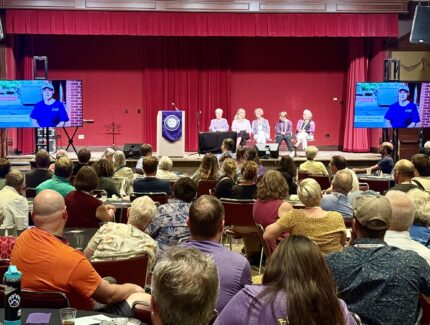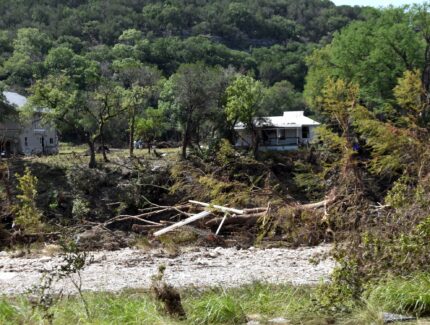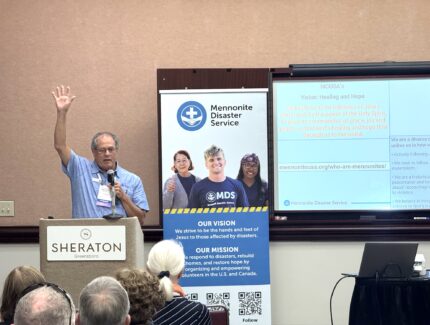


January 13, 2017
For RVers in South Carolina, every homeowner is special
Andrews, SC — Natheria Rouse has been a foster parent in Andrews, South Carolina, for 42 years. This small town bore the brunt of a “double disaster” – floods in October 2015 and Hurricane Matthew a year later – but Rouse really doesn’t know which flood caused more damage to her home.
Mennonite Disaster Service (MDS) volunteers from the recreational vehicle (RV) program are working in nearly every room of her house, repairing drywall, replacing windows, painting, fixing flooring, and simply checking in with her to see how her day is going.
The RV crew on the job in Andrews, SC in November 2016. MDS Photo/Paul Hunt
Soon, her foster children – ages 10, 6 and 5 – will get home from school, and Rouse will help them with homework and start making dinner, a routine she has accomplished with more than 100 kids over the decades in this same house.
Things take longer now that arthritis makes it difficult for her to move around but she is still able to care for kids who have nobody else. “I always wanted to be a foster parent,” she said. “I love taking care of kids and elders. It actually takes a lot of patience and love. And if you don’t have God, you can’t deal with it. I have fostered way over one hundred kids, and all of them finished high school except one.”
She holds up a finger: “And he went back and got his GED.”
One of her foster daughters who has settled in the neighborhood stops in to see her, and Rouse said she’s proud of how far the young woman has come. “She comes to say hello, just to check on me. I don’t watch her kids. She has a job. She can afford daycare. She has a place of her own and a good life.”
Rouse’s home is more than just walls; it is the headquarters that has helped her, for decades, give children a start in life that carries them – and then their children and their children’s children – out of poverty.
Norm Ringenberg, MDS project director, is overseeing the work the volunteers are doing in Rouse’s home. “I believe what she’s doing takes a special person,” he said.
But Rouse insists that it’s Ringenberg and the volunteers who are special: “They’ve been very nice. I couldn’t ask for better people. I like their prayers and their devotion.”
Volunteer Patty Nafziger, from Parkesburg, Pennsylvania, said when she first walked into Rouse’s house, the place was in such a damaged state that part of her wanted to turn around and walk back out again. “Then you begin to realize, ‘I can do this,’ and ‘I can do that.’ ”
Nafziger said she’s grateful for case managers – here they are from Catholic Charities – who gather information about who needs help the most. “Sometimes you don’t want to leave a house where you think you can do even more. And sometimes family members start coming by and saying they need help, too.”
Norm Ringenberg and his wife, Carolyn, have been RVers since 2007, traveling all over the U.S. to help people repair their homes in the wake of disasters.
Every homeowner is special to them, they agreed. “What we’ve learned the most is, when you go into a community, you accept where they’re at,” said Carolyn. “You cannot expect everybody to live exactly the way you do.”
The Ringenbergs said they remember one man who came home after volunteers had moved everything out of his damaged residence. “He was looking all over for something, and it turned out to be his hearing aids. He had set them on a nightstand and couldn’t find them,” said Carolyn.
“We ripped out his counters in one day,” said Norm. “We had to slow down and helped him locate the things that meant the most. When you are helping people, you have to be careful of their things.”
For Natheria Rouse, the most precious thing in her house is her young foster children, who are gathered around her, starting their homework under her watchful eye. “I don’t know what I’d do without Norm,” she says, then turns back to her young daughter’s spelling homework: “You got a good grade but you got one wrong. You need to redo that one word.”
Story by Susan Kim





